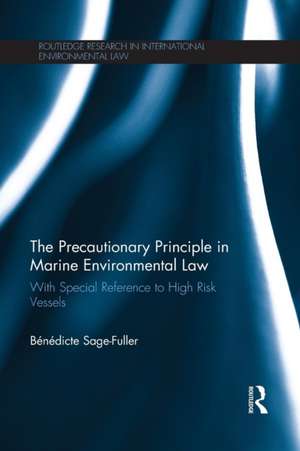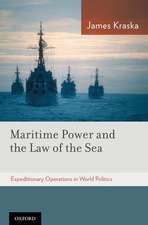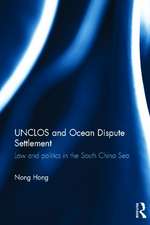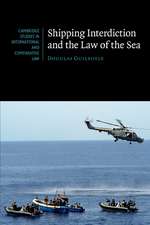The Precautionary Principle in Marine Environmental Law: With Special Reference to High Risk Vessels: Routledge Research in International Environmental Law
Autor Bénédicte Sage-Fulleren Limba Engleză Paperback – 12 oct 2015
| Toate formatele și edițiile | Preț | Express |
|---|---|---|
| Paperback (1) | 449.25 lei 6-8 săpt. | |
| Taylor & Francis – 12 oct 2015 | 449.25 lei 6-8 săpt. | |
| Hardback (1) | 1065.06 lei 6-8 săpt. | |
| Taylor & Francis – iul 2013 | 1065.06 lei 6-8 săpt. |
Din seria Routledge Research in International Environmental Law
-
 Preț: 311.62 lei
Preț: 311.62 lei -
 Preț: 108.70 lei
Preț: 108.70 lei -
 Preț: 325.89 lei
Preț: 325.89 lei - 16%
 Preț: 296.73 lei
Preț: 296.73 lei - 18%
 Preț: 1006.07 lei
Preț: 1006.07 lei -
 Preț: 416.22 lei
Preț: 416.22 lei -
 Preț: 436.14 lei
Preț: 436.14 lei -
 Preț: 389.38 lei
Preț: 389.38 lei -
 Preț: 384.70 lei
Preț: 384.70 lei - 25%
 Preț: 766.65 lei
Preț: 766.65 lei -
 Preț: 329.06 lei
Preț: 329.06 lei - 12%
 Preț: 299.45 lei
Preț: 299.45 lei -
 Preț: 424.16 lei
Preț: 424.16 lei - 12%
 Preț: 299.03 lei
Preț: 299.03 lei -
 Preț: 416.22 lei
Preț: 416.22 lei - 18%
 Preț: 1000.27 lei
Preț: 1000.27 lei -
 Preț: 415.67 lei
Preț: 415.67 lei -
 Preț: 432.29 lei
Preț: 432.29 lei - 17%
 Preț: 270.82 lei
Preț: 270.82 lei -
 Preț: 389.38 lei
Preț: 389.38 lei -
 Preț: 489.26 lei
Preț: 489.26 lei - 19%
 Preț: 246.31 lei
Preț: 246.31 lei - 14%
 Preț: 300.09 lei
Preț: 300.09 lei - 15%
 Preț: 420.20 lei
Preț: 420.20 lei - 8%
 Preț: 326.01 lei
Preț: 326.01 lei - 18%
 Preț: 1068.77 lei
Preț: 1068.77 lei -
 Preț: 461.66 lei
Preț: 461.66 lei - 18%
 Preț: 1054.27 lei
Preț: 1054.27 lei - 16%
 Preț: 262.75 lei
Preț: 262.75 lei - 13%
 Preț: 322.56 lei
Preț: 322.56 lei - 18%
 Preț: 1065.06 lei
Preț: 1065.06 lei - 18%
 Preț: 1065.06 lei
Preț: 1065.06 lei
Preț: 449.25 lei
Nou
Puncte Express: 674
Preț estimativ în valută:
85.97€ • 91.93$ • 71.68£
85.97€ • 91.93$ • 71.68£
Carte tipărită la comandă
Livrare economică 18 aprilie-02 mai
Preluare comenzi: 021 569.72.76
Specificații
ISBN-13: 9781138189805
ISBN-10: 1138189804
Pagini: 336
Ilustrații: 2 black & white tables
Dimensiuni: 156 x 234 x 17 mm
Greutate: 0.45 kg
Ediția:1
Editura: Taylor & Francis
Colecția Routledge
Seria Routledge Research in International Environmental Law
Locul publicării:Oxford, United Kingdom
ISBN-10: 1138189804
Pagini: 336
Ilustrații: 2 black & white tables
Dimensiuni: 156 x 234 x 17 mm
Greutate: 0.45 kg
Ediția:1
Editura: Taylor & Francis
Colecția Routledge
Seria Routledge Research in International Environmental Law
Locul publicării:Oxford, United Kingdom
Public țintă
PostgraduateCuprins
1. High Risk Vessels 2. Coastal States’ Jurisdiction under the United Nations Convention on the Law of the Sea 3. Significance of the Precautionary Principle in Marine Law 4. Practical Applications of the Precautionary Principle in Marine Protection Law 5. Application of the Precautionary Principle and Vessel-source Pollution
Recenzii
This is a highly insightful book, written with enviable clarity, and makes a considerable contribution to the literature on navigational issues generally and the precautionary principle specifically. It is a challenging and provocative text, shedding light on current decision-making processes in marine affairs and questioning the malleability of the law of the sea in responding to current and future threats from international shipping. - Richard Caddell, Swansea University, for Journal of the History of Collections, Vol. 26, no 2, July 2014
Overall, the book presents an engaging and eloquent analysis. With its focus on the risks posed by HRV to the marine environment, the book undoubtedly addresses an important practical concern. In making the case for an increase in coastal States’ powers with regard to HRV based on the precautionary principle, the discussion expands its focus at times to provide context as to how the precautionary principle influences other marine sectors. As such, the book provides an insightful examination of the ways in which navigational regulations are infused with a precautionary rationale. - Aline Jaeckel, University of New South Wales, for The International Journal of Marine and Coastal Law (2015)
Overall, the book presents an engaging and eloquent analysis. With its focus on the risks posed by HRV to the marine environment, the book undoubtedly addresses an important practical concern. In making the case for an increase in coastal States’ powers with regard to HRV based on the precautionary principle, the discussion expands its focus at times to provide context as to how the precautionary principle influences other marine sectors. As such, the book provides an insightful examination of the ways in which navigational regulations are infused with a precautionary rationale. - Aline Jaeckel, University of New South Wales, for The International Journal of Marine and Coastal Law (2015)
Descriere
The book sets out how a coastal state under international law could regulate international shipping where vessels pose a significant risk to their coastal and marine environment. The book argues that the use of of the precautionary principle would allow states to intervene where they consider vessels to be an unacceptable risk to the environment, in order to prevent or minimise the risk of occurrence of an accident or incident leading to environmental damage.














